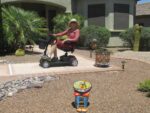New to rollators for ALS? Here’s what helped me adjust
Having to use a mobility aid for the first time can be intimidating or scary

Last week, I received an email from a newly diagnosed ALS patient asking questions about rollators (walkers with wheels). “I think it’s time I begin using one,” he wrote, “but I don’t want to. What can I do instead?” I immediately felt empathy and sympathy for his situation because I can remember feeling that way, too.
I’m no rollator expert, but I’ve been depending on one to help me walk for the past 14 years, so maybe I do have some street cred on the topic. Once I got past the initial emotions that were holding me back, I found that using a rollator to help me walk has been essential to my success while living with ALS.
My rollator journey
My ALS symptoms began in 2010, and by the end of that year, my neurologist had diagnosed me. I had weak leg muscles and had fallen a few times. My right foot dragged with each step, and I needed to grab the furniture as I walked through the house. My doctor recommended that I start using a rollator.
Being told I needed one meant I had to accept that I wouldn’t recover from ALS. It was a permanent condition, my new normal. I had lots of negative notions about rollators, such as “only old people used them,” “my friends will think less of me,” and “they’re rickety, clunky, and always-in-the-way.”
But having to be helped up from a fall was no fun, either, so I gave in and bought one.
Newfound success
With a rollator, navigating through our house became easier, and I learned little tricks to add to my safety. At the bathroom sink, for example, I swing my rollator directly behind me and lock the brakes. This transforms it into an emergency landing pad should I happen to teeter backward. Or, when doing my daily exercise routine, I stand directly in front of a sturdy chair with my rollator parked in front of me, wheels locked in place. I can perform any number of simple calisthenic movements knowing that if I should lose balance, the chair is behind me and my rollator is an easy grab in front.
When out and about, I discovered that my friends were relieved I was using a rollator. They were fearful of my previous tendency to fall and didn’t mind at all that it showed up beside me in our group photos.
Looking back, I realize that the evolution of my mindset from initially disliking rollators to acceptance and even sharing my tips has come a long way. Emotionally, I applied my principles of adapt, learn, survive.
A-L-S
I took the time to reflect on my feelings about how ALS has changed my life. I thought about how my ability to walk had been limited, and because I wanted to continue to be socially active, a rollator was the answer. I adapted.
Then I practiced walking with my rollator, learning what I could and couldn’t do with it. For example, rolling through lumpy grass and gravel is treacherous, and I need someone to hold my elbow while rolling along a downhill walkway.
Mostly, though, the more I used my rollator the more I saw its worth. Now I can’t imagine my life without one.
I probably overwhelmed my ALS friend with too many tips and resources on rollators. But I think he appreciated knowing that using a rollator was so helpful for me.
Do you use a rollator, or have you just begun using one? Please share your tips in the comments below, or try a few of mine. Together, we can help each other as we learn to live well with ALS.
Note: ALS News Today is strictly a news and information website about the disease. It does not provide medical advice, diagnosis, or treatment. This content is not intended to be a substitute for professional medical advice, diagnosis, or treatment. Always seek the advice of your physician or other qualified health provider with any questions you may have regarding a medical condition. Never disregard professional medical advice or delay in seeking it because of something you have read on this website. The opinions expressed in this column are not those of ALS News Today or its parent company, BioNews, and are intended to spark discussion about issues pertaining to ALS.








Comments
Edward
I am currently on that rollator fence after being diagnosed 1 year ago. Still walking, but distance is not an option any more. Any advice on rollators will be appreciated.
Dagmar Munn
I'm happy to answer your questions. But by all means do not delay. Don't wait for a fall to happen. Meanwhile, do check out my posts in the section "Mobility (Rollators, Scooters, etc.) Tips" at my blog https://alsandwellness.blogspot.com/2017/09/als-and-wellness-blog-archives.html
Viola
Hello my name is Viola from Uganda. My younger sister was equally diagnosed with ALS about three years ago now. She can't walk or talk clearly. The neurologist recommend that we take riruzole alongside other medications. We can't even afford a rollator and riruzole is not available in my Country Uganda in subsaharan Africa. Kindly members on this forum, do you think there is a way of helping us out. Thanks in advance, Viola.
Dagmar Munn
Have you tried contacting - - ALS Worldwide https://alsworldwide.org/ They may be able to offer help.
Martha Whitaker
At first I was resistant to a rollator, I wanted to keep using my wooden walking stick. I started using the rollator as a place to sit down when I was in a line or I was standing too long. It was also handy to carry things.
My rollator from the ALS loan closet was bright blue, but with slurred speech I could not say blue. I decided to name it Sapphire My green medical cane was named Emerald. When I got a red electric scooter I named it Ruby. I am saving the name Diamond for a power wheelchair. I look at my "jewels" as tools to help me keep doing the things I can still do. It's more fun to out with Ruby or Sapphire and I am conserving energy for more important things.
Dagmar Munn
Hurrah to you Martha! I love the names you've given them! Best wishes to you. Dagmar
Patricia Hancock
Thank you, Dagmar, for your article. It really helped me notice my own resistance and get past the psychological hurdle of not wanting to be seen as disabled. (I'm embarrassed I had these feelings, as I thought having a daughter with Down syndrome had made me immune to that way of thinking, but apparently I still had some work to do.). Now I am happily traversing greater distances on my snazzy all terrain carbon rollator my husband got me on Amazon. At first it felt awkward, now I like to imagine that we're out there helping the world become more aware and understanding for all of us, including my daughter and all her buddies.
Having a seat to sit down on whenever I need it is priceless.